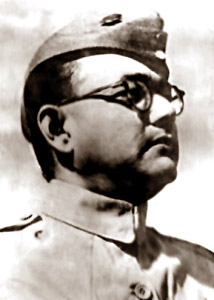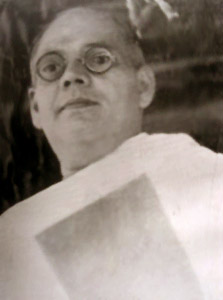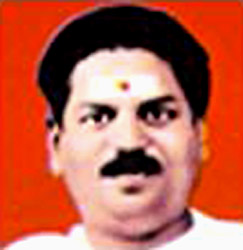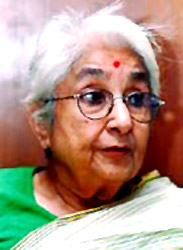 All India Forward Bloc was established as a faction led by Subhas Chandra Bose within the Indian National Congress. But after the Indian independence, the party re-accomplished as an independent political party. Today it is regarded as the leftwing nationalist political party in India though it has its strong fortified defensive structure in West Bengal. The formation of this party was declared in a rally that took place in Kolkata with the aim to `rally all the leftwing sections within the Congress and develope an alternative leadership inside the Congress`. In the beginning, Subhas Chandra Bose was the president of Forward Bloc along with S.S. Cavesheer as its vice-president.
All India Forward Bloc was established as a faction led by Subhas Chandra Bose within the Indian National Congress. But after the Indian independence, the party re-accomplished as an independent political party. Today it is regarded as the leftwing nationalist political party in India though it has its strong fortified defensive structure in West Bengal. The formation of this party was declared in a rally that took place in Kolkata with the aim to `rally all the leftwing sections within the Congress and develope an alternative leadership inside the Congress`. In the beginning, Subhas Chandra Bose was the president of Forward Bloc along with S.S. Cavesheer as its vice-president.
In July 1939, the Forward Bloc Committee was announced by Subhas Chandra Bose, comprising Subhas Chandra himself as President, S.S. Cavesheer from Punjab as its vice-president, Lal Shankarlal from Delhi as its General Secretary and Pandit B Tripathi and Khurshed Nariman from Bombay as Secretaries. Annapurniah from Andhra Pradesh, Senapati Bapat, Hari Vishnu Kamnath from Bombay, Pasumpon U Muthuramalingam Thevar from Tamilnadu and Sheel Bhadra Yajee from Bihar were the other noteworthy members of All India Forward Bloc. A newspaper titled Forward Bloc was begun in the same year by Subhas Chandra Bose.
The first All India Conference of Forward Bloc took place in Nagpur, on June 20-22, 1940. Subhas Chandra Bose was selected as the president of the party. `All Power to the Indian People`, a resolution was taken in the conference - with a urge of militant action for struggle against British colonial rule. But after Bose`s escape from police custody in 1941, the British authorities banned Forward Bloc in 1942. Around the country, offices of the party was also ransacked. But the local activists of Forward Bloc still continued their anti-British activities without central coordination.
 Forward Bloc was reorganised itself after the war. An All India Active Workers Conference was organised in February 1946 under the supervision of R.S. Ruiker in Jabalpur, Madhya Pradesh. The formation of the `FB Workers Assembly` was declared in the conference, in practice the legal cover of the still illegal Forward Bloc. The Workers Assembly declared in the conference that "Forward Bloc is a a Socialist Party, accepting the theory of class struggle in its fullest implications and a programme of revolutionary mass action for the attainment of Socialism leading to a Classless Society." The ostracise on the Bloc was lifted in June that year before the 1946 assembly elections; Forward Bloc participated in the election. As a result H.V. Kamath won a seat in the Constituent Assembly and Jyotish Chandra Ghosh, Hemantha Kumar Basu and Lila Roy won seats in the Bengal Legislative Assembly. But a rift distinctly took place in the ideology of the bloc. One section was charmed by Marxism while the other bore on `Subhasism`, a syncretic political theory comprising socialism, nationalism and Indian spiritualism.
Forward Bloc was reorganised itself after the war. An All India Active Workers Conference was organised in February 1946 under the supervision of R.S. Ruiker in Jabalpur, Madhya Pradesh. The formation of the `FB Workers Assembly` was declared in the conference, in practice the legal cover of the still illegal Forward Bloc. The Workers Assembly declared in the conference that "Forward Bloc is a a Socialist Party, accepting the theory of class struggle in its fullest implications and a programme of revolutionary mass action for the attainment of Socialism leading to a Classless Society." The ostracise on the Bloc was lifted in June that year before the 1946 assembly elections; Forward Bloc participated in the election. As a result H.V. Kamath won a seat in the Constituent Assembly and Jyotish Chandra Ghosh, Hemantha Kumar Basu and Lila Roy won seats in the Bengal Legislative Assembly. But a rift distinctly took place in the ideology of the bloc. One section was charmed by Marxism while the other bore on `Subhasism`, a syncretic political theory comprising socialism, nationalism and Indian spiritualism.
The second conference of the All India Forward Bloc was held between January 12-14, 1947 in Arrah, Bihar. S.S. Cavesheer (a leading member of the Subhasist sector) was selected as President and Sheel Bhadra Yagee (a leading member of the Marxist sector) was picked out as General Secretary and the party took the name `All India Forward Bloc`. Accompanying this fact, a national council was held in Bauria, West Bengal, that affirmed once again on the demand of `boycotting the Constituent Assembly as well as issuing a decree that Bloc members of state legislatures would resign`.
Following the independence of India and partition issue, general secretary Yagee proposed to divide Forward Bloc into a Forward Bloc for India and a Forward Bloc for the new nation of Pakistan. He had also proposed to unthaw the Bengal committee of the Forward Bloc and set-up ad hoc committees for West Bengal and East Bengal. Due to this decision, the division between `Marxists` and `Subhasists` reappeared on the surface. As a result Yagee resigned from the post of general secretary. However, the fall out stayed within the party. The `Subhasist` group called for a conference in Chandranagar, West Bengal, led by Ruiker and Cavesheer. On the same dates Yagee also unionised a conference in Calcutta. Later on, the Yagee-led group embraced a red flag with a leaping tiger and a hammer and sickle. Bihar, Punjab and West Bengal are the areas where the Yagee-led group had a stronghold. The Ruiker-led group had its strongly fortified defensive structure throughout Madhya Pradesh and West Bengal.
In the same year the Yagee-led group decided to join the United Socialist Organisation of India, a front led by Subhas Chandra Bose`s elder brother Sarat Chandra Bose. However, some members repelled against this decision, and went on to form the Forward Communist Party. However due to the initiation of Yagee, a merger between the Forward Bloc and the Desh Sevak Party, took place in October 1949, led by INA officers General Mohan Singh and Colonel Guridal Singh Dhillon. After this merger Mohan Singh was appointed the chairman of the Forward Bloc and Dhillon was ordained as its General Secretary. The merger acted as a moral boost for the party. Again in 1951, the Ruiker-led Forward Bloc reunited with the party. At the joint central committee meeting, Mohan Singh and Dhillon were re-elected as the party Chairman and General Secretary.
The party was aiming to take part as the `Forward Bloc (Marxist)` in the 1952 election. But before the election they withdrew their name from the font comprising the Communist Party of India, Tripura Ganatantrik Sangha, Ganamukti Parishad, Ganatantrik Nari Samiti in Tripura as they decided to contest on their own. But nobody was elected in the election. By the year 1955, the Indian National Congress declared that they have adopted `socialism` as its policy. Yagee and Mohun Singh declared the unification of the Forward Bloc into the Congress. But many sections within the party disagreed with this merger and Yagee and Mohun Singh were replaced by Hemanta Kumar Bose as the new Chairman and R.K. Haldulkar as General Secretary. But after the assassination of Subhas Chandra Bose in 1945, U. Muthuramalingam Thevar from Tamil Nadu was selected as deputy chairman of the party.
 In April 1964, the Forward Bloc along with Samyukta Socialist Party participated in a joint socialist anti-Nehru campaign conference. After the death of U. Muthuramalingam Thevar in 1963, the power struggle between two of his disciples, Sasivarna Thevar and P.K. Mookiah Thevar came out on the social plain. P.K. Mookiah Thevar won and Sasivarna Thevar departed to form his own party, the Subhasist Forward Bloc. In 1965, the party joined a `Progressive Front` in Tripura, which consisted of the Communist Party of India (Marxist), Communist Party of India, the Forward Bloc and a break-away faction of the Socialist Party. The year 1968 experienced a split in Tamil Nadu; vehement clashes erupted in West Dinajpur, West Bengal, in 1969, between peasants aligned with the Communist Party of India (Marxist) and East Pakistani refugee cultivators, who supported the Forward Bloc.
In April 1964, the Forward Bloc along with Samyukta Socialist Party participated in a joint socialist anti-Nehru campaign conference. After the death of U. Muthuramalingam Thevar in 1963, the power struggle between two of his disciples, Sasivarna Thevar and P.K. Mookiah Thevar came out on the social plain. P.K. Mookiah Thevar won and Sasivarna Thevar departed to form his own party, the Subhasist Forward Bloc. In 1965, the party joined a `Progressive Front` in Tripura, which consisted of the Communist Party of India (Marxist), Communist Party of India, the Forward Bloc and a break-away faction of the Socialist Party. The year 1968 experienced a split in Tamil Nadu; vehement clashes erupted in West Dinajpur, West Bengal, in 1969, between peasants aligned with the Communist Party of India (Marxist) and East Pakistani refugee cultivators, who supported the Forward Bloc.
The year 1969 also experienced a major split in the Indian National Congress. Two separate Congress parties effectively appeared- the Congress(R) led by Indira Gandhi and the Congress(O) led by Kamaraj. All India Forward Bloc contested the 1971 and 1972 elections but could not win a single seat. After the 1972 election, Forward Bloc settled to join a `United Front` led by the communist parties in Tripura. The 1977 election was considered a crucial one in Indian political history. Congress, for the first time in independent India was spreadeagled in a national election. Forward Bloc had contested four seats in the Lok Sabha election. The party had three candidates from West Bengal who were endorsed by the Left Front, out of whom all three were elected. A Left Front was constituted, consisting the CPI(M), RSP and Forward Bloc in Tripura. Left Front formed a majority government in Tripura in the beginning of 1978.
 In building a front much before the 2000 Bihar legislative election, All India Forward Bloc joined with other political parties like, Bharatiya Jan Congress, the Bihar Vikas Party, the Janata Dal (Secular), the Samajwadi Janata Party and the Nationalist Congress Party. This front devoted to the aim of maintaining equidistance from the two major blocs in Bihari politics- the Rashtriya Janata Dal and the National Democratic Alliance, condeming them as `casteist and communal`. In 2002, All India forward bloc was considered as one of the four leftwing parties that has nominated Lakshmi Sehgal as a candidate for the Presidency of India. In the 2007 assembly election in Uttar Pradesh three candidates were launched by All India Forward Bloc- Ram Lakhan in Bisalpur (732 votes, 0.51% of the votes in the constituency), Samar Singh in Fatehpur (870 votes, 0.69%) and Jabar Singh in Hastinapur (503 votes, 0.42%).
In building a front much before the 2000 Bihar legislative election, All India Forward Bloc joined with other political parties like, Bharatiya Jan Congress, the Bihar Vikas Party, the Janata Dal (Secular), the Samajwadi Janata Party and the Nationalist Congress Party. This front devoted to the aim of maintaining equidistance from the two major blocs in Bihari politics- the Rashtriya Janata Dal and the National Democratic Alliance, condeming them as `casteist and communal`. In 2002, All India forward bloc was considered as one of the four leftwing parties that has nominated Lakshmi Sehgal as a candidate for the Presidency of India. In the 2007 assembly election in Uttar Pradesh three candidates were launched by All India Forward Bloc- Ram Lakhan in Bisalpur (732 votes, 0.51% of the votes in the constituency), Samar Singh in Fatehpur (870 votes, 0.69%) and Jabar Singh in Hastinapur (503 votes, 0.42%).
All India Forward Bloc in India has always struggled for socialism. This idea differs from the Communist Party of India (Marxist) and Communist Party of India, as they built their socialism on foreign ideologues as Marx and Lenin. The idealogy of socialism of AIFC is the Indian socialism of Subhas Chandra Bose. Today, All India Forward Bloc has expanded its branch throughout India, though its heart is concentrated in West Bengal. All India Forward Bloc is part of the Left Front government in West Bengal. Apart from West Bengal, AIFC is also co-operating with CPI(M) in Tripura and on the national level as well. But it is not a part of the Left Democratic Front in Kerala. In the 2004 Lok Sabha Election, AIFC received 0.4% of votes and three seats (All from West Bengal).
Forward Bloc was significantly active in Andhra Pradesh during the 1950s. In 2005, the party revived their Andhra Pradesh State Committee. Forward Bloc had no existance there in the timebeing. They have a small state unit in Haryana. Com. D.K Sharma is the chairman of Haryana State Committee. In 1948, All India Forward Bloc established their existence in Tripura with the help of Bengali immigrants like Sailesh Sen, Gopi Ballav Saha, Dwijen Deu, Anil Dasgupta, Hiren Nandi and Sati Bhardwaz. Today they are the significant members ruling the Left Front coalition. In Tripura the labour fronts of CPI, RSP and AIFB formed the Shramik Aikya Manch (Workers United Front).
Under the banner of All India Forward Bloc, there are some other parties too in India like, All India Youth League; All India Students Bloc; Trade Union Coordination Committee; All India Agragami Kisan Sabha (peasants` organization); All India Agragami Mahila Samiti (women`s organization).



















